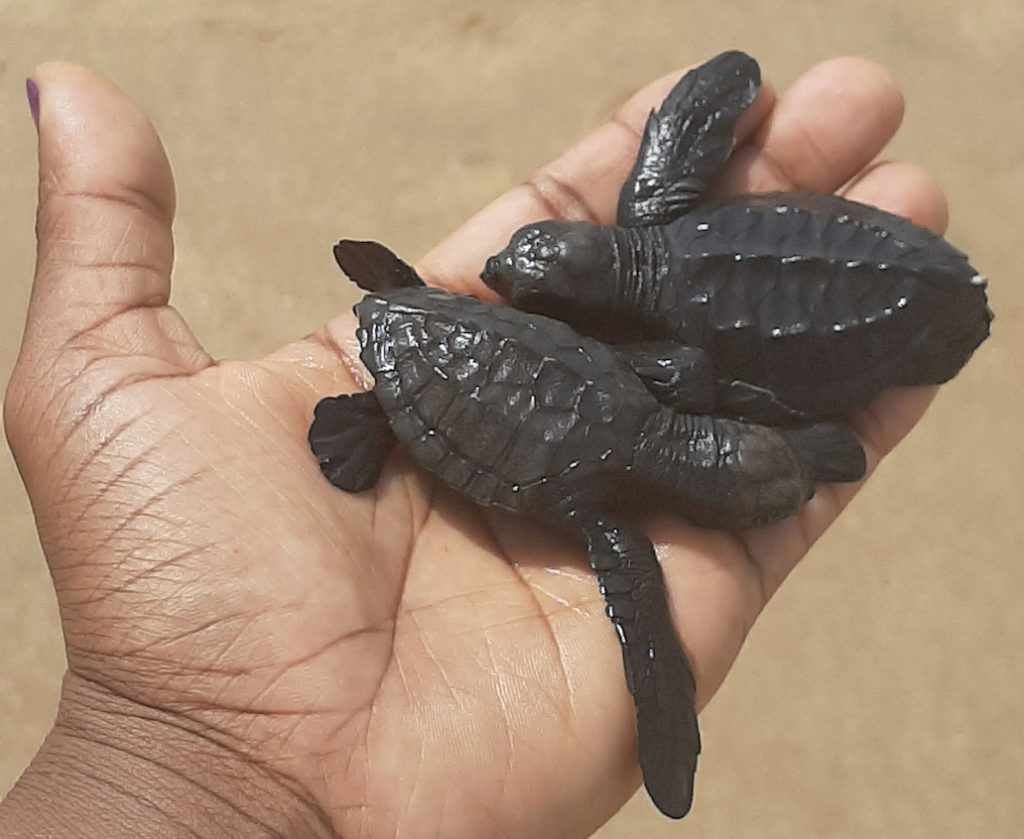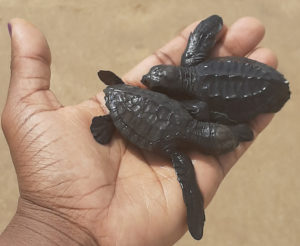This past Sunday I was that creepy adult crashing a kid’s party. In my defense, I had in fact recieved an invitation – for my three year old daughter. Unfortunately the intended recipient was already on a transcontinental flight out of the country with Daddy dearest when the invite arrived. Reading the details for the party, shortly after I had dropped them off at the airport – birthday cake, beach, releasing turtles into the open seas – I had already decided that I would be going, toddler or not. I would to be that shameless parent at a toddler’s party without my kid. And why the hell not? Releasing turtles into the wild was an experience that I certainly did not want miss. And so, on Sunday morning, temporarily without chick nor child (or significant other) to slow me down, I was the first to arrive on the beach, ready to do some good and eat some birthday cake too.
As I stood on the sand, drenched in sweat, the morning sun blazing down my back, I felt a flutter in my stomach as I held two tiny hatchlings in the palm of my hands. I generally avoid emotional public displays, but getting ready for the hatchlings’ big release I was almost moved to tears. I imagined that I was contributing to something much bigger than myself and it felt good. There I was helping these precious little creatures to find their way back to the wild, where they belonged and would surely flourish. But then, as I watched them, flippers flittering on the scorching sand, heading towards freedom, my feel good moment quickly gave way to a more macabre realization. I can’t recall now, but perhaps this new line of thinking was brought on after spotting one or two errant pieces of plastic bags along the shore. Or perhaps just letting them go had created the emotional distance necessary for the return of my overly critical and cynical mind. Whatever the case may be, I quickly began to question whether the turtles would really flourish? Would they even survive? Was I doing them any good or simply sending them off to meet their inevitable demise?
Turning to another parent, who was standing close by, I shared my apprehensions, whispering so as not to ruin the magical moment for the munchkins, who had by now erupted into squeals of delight, watching their hatchlings head towards the sea. Unlike me, the parent next to me had done his homework and quickly confirmed that my doubts were well-founded. The future of the hatchlings was indeed a grim one. In hushed tones he informed me that one out of a hundred turtles survived. Later, when I returned home, some quick research revealed that the statistics were much bleaker than that. Only one in a thousand sea turtles made it to adulthood, and that statistic did not include the negative impact of human activities on the species’ survival rate.
As I mulled over this depressing new discovery, I wondered how could our participation in such an incontestable act of goodwill have such a negligible impact. We’d all been convinced that we had helped the hatchlings. But in fact, not one of the turtles we had released that morning would make it. As we sat on the beach feeling accomplished, devouring our Oreo cookie double chocolate birthday cake, many of the hatchlings had probably already been ensnared in a fisherman’s net or suffocated by plastic debris in the waters we had polluted and released them into. From the hatchlings’ perspective, perhaps the only good that had occurred that day was convincing ourselves that we had done them some good. Sitting in front of my computer screen in an empty house, it wasn’t long before my cynical mind got to work, drawing a parallel between the morning’s activity and my expatriation in Benin.
Three years ago I left behind luxuries of life in one of the wealthiest European cities, convinced that I could do good in a country that I could not initially locate on the world map. My ignorance about Benin was a minor detail, muted by self confidence – what I know recognize as hubris – in my own abilities and selfless desire to do good. I was an educated woman of color. Born in a developing country myself, I was ready to return to my roots and contribute to improving the lot of my fellow “brethren” and “sistren” (with whom, it turned out, I had very little in common). In truth, as a (former) aspiring development practitioner, I was also motivated by a need to fill a requisite experience on my C.V: “field work”. And so, like many development practitioners in the field – though they would be loathe to admit it – my presence on the African continent was not totally driven by a burning desire to be the ultimate altruist. But as I have learned in my years abroad, this was not worst of the crimes I and many other well intentioned expats have committed.
Recently I have come to accept a sad and sobering fact; what little good we have done during our time here is negligible in comparison to the harm that is being perpetuated by our participation in the systemic economic exploitation of cheap local labor.
Upon arriving in Cotonou we reluctantly decided to hire the personnel – a cook, driver and nanny- of the family that previously lived in our home. At first, thinking of our need for privacy and independence, and driven by an underlying discomfort of being waited upon in our home, we were hesitant to keep them all on. But after much deliberation we convinced ourselves that they’d be better off working with us than left to face unemployment. After a week long trial run with our new staff, our hesitance slowly disappeared and we found ourselves warming up to the idea of having help at home. Living the expat dream. Still, I was never comfortable with the perpetual presence of others in my personal space. But over the years I convinced myself that this was a worthwhile sacrifice. I was doing some good, putting my egotistical desire for privacy and independence aside, so as not to jeopardize the livelihood of our staff.
Three years later, as we approach the end of our mission I have begun to question what I thought was an incontestable act of goodwill. Have we really had a positive impact on their lives? In our time here, we have doubled their salaries, contributed to their social security benefits and children’s tuition, provided a thirteenth salary and reimbursement for their medical costs. We’ve learned that this is above and beyond the norm and have even been chastised by other penny-pinching expats, who have warned us about disrupting the market equilibrium. In spite of all we’ve done the members of our staff have continued to struggle. Their requests for loans and small salary advances have not abated over the years. Our driver and cook do not own their own homes, which are often flooded during the rainy season and they struggle to keep their families healthy. Although they have expressed gratitude for our generosity, I sometimes believe that their occasional obsequious gestures and syrupy servile tones betray a deeper discontentment with a less than ideal reality. One in which they have to serve foreigners who come to reap the benefits of a lower cost of living, living in luxury, purporting to do good, but leaving local hires trapped in a cycle of low paying jobs that do little to improve their situation.
As we get ready for our departure I have been plagued by the thought that we haven’t done enough to support our staff but have simply benefited from an unjust system of economic exploitation.
What will happen when we leave?





